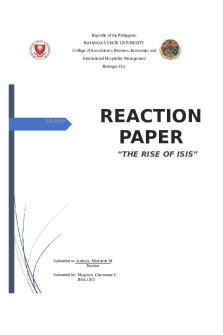Reaction paper 3 thanks for the memories PDF

| Title | Reaction paper 3 thanks for the memories |
|---|---|
| Course | Introduction To Psychology |
| Institution | Suffolk County Community College |
| Pages | 2 |
| File Size | 56 KB |
| File Type | |
| Total Downloads | 51 |
| Total Views | 140 |
Summary
reaction paper on how memories are made and how they can be changed....
Description
Ashley Blasberg 26 October 2017
In Reading number sixteen, Thanks for the Memories, I found it particularly interesting about how our memories are constantly being reconstructed. I first learned about this concept two years ago, and every time I have seen it after, it still continues to make me feel weary! The idea that every single memory we have can be considered just a recreation, and not necessarily how it occurred is so freaky. I think the first study, conducted by Loftus, with the car running the stop sign and then asking if the two different groups of people saw a stop sign present, results were interesting. The video was less than a minute, so I would have thought that nearly everybody would have noticed the stop sign. However, the second group which was asked how fast the car was going around a turn, only 35% of the people saw a stop sign. The first group were asked a question about how fast the car was going through the stop sign, and 53% saw the stop sign, which actually surprised me, I would have thought the number would be in the 70-80% range. I think the idea of questioning eye witnesses is also intriguing. Whenever there is a court case, I feel if there is a witness testifying, the jury is more likely to sway in the side of that witness because of how strongly people tend to believe everybody else’s memories. Before a trial, the lawyer’s will always go over with their witness’s the questions that could be asked, and what actually happened, and I always assumed that this was because the lawyer’s wanted to make sure that nothing would change in their story and there wouldn’t be a shocking discovery in the last minute. I also thought they did this so they could coach the person on what to say to help them win, which is definitely a big reason on why they do this, but I never took into account that a lawyer with a background with psychology, or general knowledge of this, would want to cement
the factual events of the occurrence without there being any new inputs. I think that knowing how easily a simple idea can become integrated into a memory could also be another reason why lawyers want the story to be told over and over again. I found Loftus’ view point on the nature of abuse and memories surprising. I have always been taught that people repress traumatic events in their brains. I always believed this to be true, and Loftus’ second theory that the memories are not actually repressed, they are just unwanted thoughts, so they are not thought about, was a valid point because I do agree that some of the easiest things to remember are painful experiences. I think that dealing with something as complex as the brain, and something like the process of memorization can lead to a lot of different opinions. As technology begins to improve, maybe there can be a decisive answer, but I think at the moment, there is not one sure answer. There are a lot of times that memory is supposed to be relied upon in our current society, especially within schools, and knowing how easily memories and be infiltrated and changed is eye opening. I am not surprised by that though because there have been more than a few times when I was absolutely positive something had happened, and it turned out to be more false than true. Overall, I thought this was an interesting read, and one I was not unaware of, but it still surprises me how memories can be false....
Similar Free PDFs

The corporation reaction paper
- 1 Pages

What the Health Reaction Paper
- 2 Pages

Reaction paper
- 1 Pages

Reaction Paper -
- 3 Pages

REACTION-PAPER
- 7 Pages

Reaction Paper
- 1 Pages

Reaction Paper
- 2 Pages

PPT - Thanks
- 77 Pages

Reaction Paper-The Rise of Isis
- 3 Pages
Popular Institutions
- Tinajero National High School - Annex
- Politeknik Caltex Riau
- Yokohama City University
- SGT University
- University of Al-Qadisiyah
- Divine Word College of Vigan
- Techniek College Rotterdam
- Universidade de Santiago
- Universiti Teknologi MARA Cawangan Johor Kampus Pasir Gudang
- Poltekkes Kemenkes Yogyakarta
- Baguio City National High School
- Colegio san marcos
- preparatoria uno
- Centro de Bachillerato Tecnológico Industrial y de Servicios No. 107
- Dalian Maritime University
- Quang Trung Secondary School
- Colegio Tecnológico en Informática
- Corporación Regional de Educación Superior
- Grupo CEDVA
- Dar Al Uloom University
- Centro de Estudios Preuniversitarios de la Universidad Nacional de Ingeniería
- 上智大学
- Aakash International School, Nuna Majara
- San Felipe Neri Catholic School
- Kang Chiao International School - New Taipei City
- Misamis Occidental National High School
- Institución Educativa Escuela Normal Juan Ladrilleros
- Kolehiyo ng Pantukan
- Batanes State College
- Instituto Continental
- Sekolah Menengah Kejuruan Kesehatan Kaltara (Tarakan)
- Colegio de La Inmaculada Concepcion - Cebu






